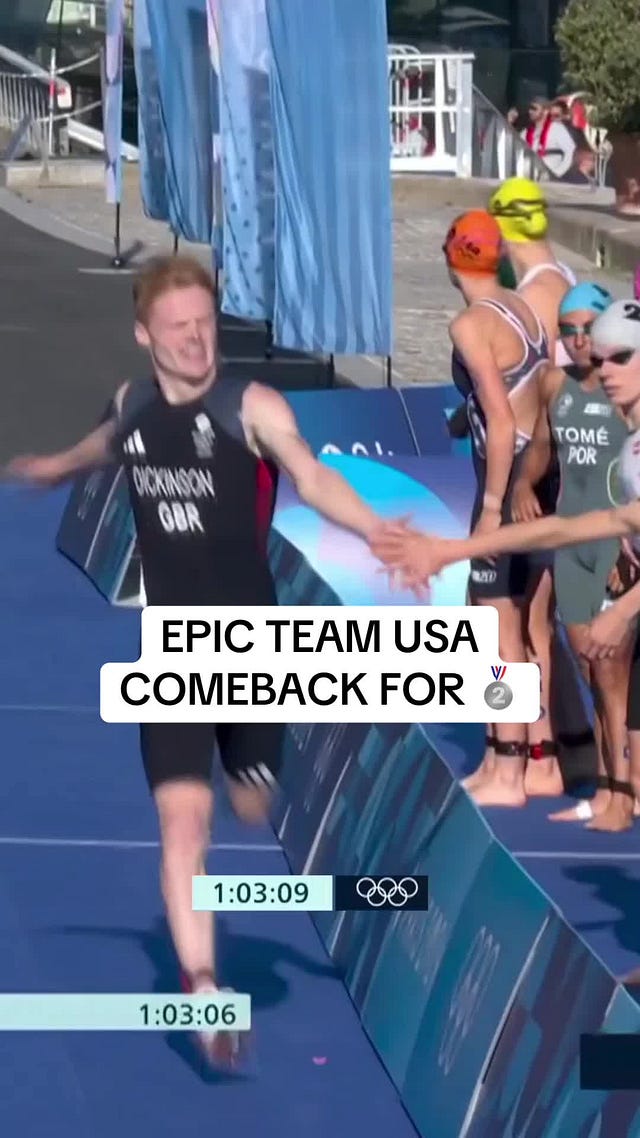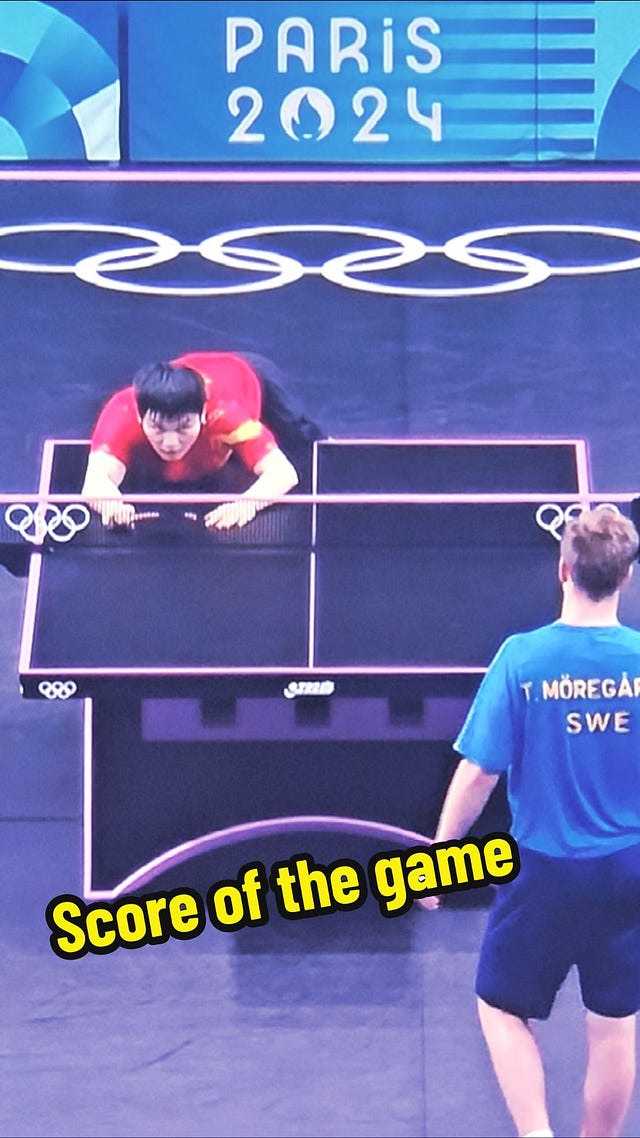Rings Roundup, Day 10: Tahiti wins gold in Tahiti
Plus, Mondo's mondo pole vault, a golden 3x3 buzzer beater, and more.
7 Rings: Tahiti knows Tahiti best
The Olympics are generally held in the biggest places in the world—Paris, London, Tokyo, pulsing metropoles with millions upon millions. Monday, though, the Olympics became a celebration of a small place 10,000 miles away from the rest of the Paris games. Tahitian-born surfer Kauli Vaast won the Olympic surfing contest in Teahupo’o, Tahiti—not simply by coincidence, but because he knew how to surf the waves in Tahiti better than the competitors who came from America and Australia and Brazil.
Vaast was vastly better at mastering the conditions in Teahupo’o than his opposition. In the gold medal match, Vaast sent two spectacular barrels, scoring a 9.5 and an 8.17 out of 10. His opponent, Australia’s Jack Robinson, was only able to ride one scoring wave the entire 35-minute heat, getting a respectable 7.83.
Tahitian waves are different. While other waves are better for big swooshing turns and aerial tricks, the break in Teahupo’o is too powerful for any of that. You just have to ride the barrel and hope you come out the other side. Time and time again Vaast did that. He knew where the waves would form, where he needed to be and when, soaring out of the barrels triumphantly with his arms flexed.
Vaast had never won a major pro event. In fact, he’s not even on the World Surf League’s Championship Tour, which features the top 24 surfers in the world. (He’s in the Challenger Series, trying to get a spot in the Championship Tour, but is currently in 46th place, needing to reach the top 10 to make it.) But he has consistently overperformed at Tahiti, winning several junior events there and turning wild card invites to the WSL’s Teahupo’o pro event into second- and third-place finishes.) In my Olympics preview, I wrote about the possibility that Vaast or women’s competitor Vahine Fierro could win the competition—I’m taking credit for this as my best call of the Olympics. (Fierro reached the quarters, with Team USA’s Caroline Marks getting the gold medal.)
I’m a sucker for islands, in case you couldn’t tell from my sentimental write-up of St. Lucia and Dominica winning their first Olympic golds the other day. But this wasn’t just a Tahitian winning gold: This was a Tahitian winning gold in Tahiti because he knows Tahiti better than the outsiders. It’s true that Tahiti is a part of French Polynesia, which is a part of France, so Vaast competed under the French flag and they played Le Marseillaise when he got gold. But look at the crowd who gathered to watch him. They’re going nuts and waving the French Polynesian flag, featuring a Polynesian canoe riding the waves like Vaast did. They don’t have self-determination yet, but they have surf-determination!
Vaast isn’t the best overall surfer in the world. If this event was held most other places, it’s doubtful he would’ve reached the podium. And it feels a little strange to give out a gold medal based on such specific talent. Maybe ideal surfing event would be held at a place like Kelly Slater’s Wave Ranch, an artificial pool in the middle of the California desert with a wave machine that can pump out perfect waves of differing styles instead of waiting around for the right weather conditions.
But I love that this sport relies so heavily on the sea and its local idiosyncrasies. It creates a home-court advantage no human could ever build, and no wave pool could produce a more meaningful moment than this one.
6.25 Rings: Mondo’s Moment
How do you make a competition compelling when everybody knows who’s going to win? This is the burden of Cajun-born Swede Mondo Duplantis, the best pole vaulter of all time.
There was literally no competitive reason for one of the most compelling moments of the Olympics. Sweden’s Mondo Duplantis had already won the gold medal. All the other pole vaulters had been eliminated from the competition, Mondo had bested their marks, and could have simply said “OK, I’m done” and the competition would’ve been done.
But fans stayed in the stadium and the broadcast kept on broadcasting as Duplantis raised the bar to 6.25 meters—a full 13 inches higher than the silver medal score—to see if he could break his own world record. The second-place finisher, Team USA’s Sam Kendricks, cleared a height of 5.9 meters, which Mondo did without nerves or suspense. Kendricks quickly became a fan with very good seats: Already having accomplished everything he set out to do, he was visible on camera trying to get the crowd and the audience at home hyped up about the amazing thing they were about to witness.
Mondo milked it a bit. Not that I’m complaining—the suspense was great. He’s had some practice selling this moment. He’s had no legitimate competition for years but has gotten really good at thrilling thousands of fans who know he’s going to win, and there’s much more drama in waiting to see whether Mondo clears the bar than seeing whether a swimmer touches the wall in 3 minutes and 48 seconds or 3 minutes and 47 seconds. Mondo clearly had the height to clear the bar, but kept grazing it with some body part or another (not that one) and missed his first two attempts, setting up one last go for the record. At this point, it had been well over an hour since Mondo wrapped up the gold medal, and nobody cared.
Of course, he hit it. The crowd went nuts and Mondo made out really hard with his girlfriend:
Sometimes the Olympics is about seeing who wins. But sometimes it’s about seeing whether athletes can raise the bar—in Mondo’s case, quite literally—of what the human body is capable of.
6 Rings: A Golden 3x3 2 (aka a 3)
Last time we checked in on the 3x3 tournament, there were still gold medal hopes for Team USA in the men’s and women’s tournaments. That faded rather quickly: The men were eliminated in humiliating fashion with a 21-6 loss to the Netherlands, while the women won bronze after losing to Spain in overtime in a match broadly decided by Team USA’s foul trouble. (The No. 1 sign the Olympic sport of 3x3 is not a faithful adaptation of playground 3-on-3 basketball: The existence of “foul trouble.”)
But both gold medal games were fantastic. Germany beat Spain 17-16 for women’s gold, while the men’s championship game between the Netherlands and France went into overtime, which is won by the first team to score two points. France scored the first bucket to take a one-point lead, putting them one point away from a win. There’s only one thing you can do in this scenario: Jack up the dumbest two-pointer possible to snipe the lead and win on one shot.
AND THAT’S WHAT THEY DID.
That shot was hit by Worthy de Jong, the MVP of the tournament in my eyes. He’s a 6-foot-4 Surinamese guard with got a high jumper’s legs and a lightning-quick first step. He was the second-leading scorer in the tournament, with 7.2 points per game, spending game after game bursting past his opponents for easy layups and bricking long shots. He shot 10-for-49 on twos in the tournament, but in that magic moment drilled a shot which gave him gold.
I think the 3x3 Olympic tournament needs a serious revamp. The organizers make it as hard as possible for NBA players to participate, fearing a tournament dominated by American pros. It’s the same argument they made when the tournament was all amateurs and pros couldn’t play. It was wrong and dumb then, and it’s wrong and dumb now. You don’t hide the best players in the world! You celebrate them!
But part of the logic is that Olympic 3x3 can create its own stars specific to the sport, with skills unique to the way the game is played. 5-a-side ball didn’t work out for de Jong, who played a single year of juco ball at Ranger College in Texas. But he just won the Olympics with an electric style of play and an iconic gold medal highlight. So maybe their theory isn’t so dumb after all.
4 Rings: A Triathlon Comeback
The Olympic poop-swimming events are nearly over, and have taken their first casualties: Belgium was unable to compete in Monday’s mixed triathlon event because one of their competitors fell sick after the women’s triathlon event, held in the E. Coli-laden Seine river. It hasn’t been officially confirmed that she got sick from the river rather than some other ailment, but the timing adds up.
Still, 15 brave teams of four triathletes launched their bodies into the river, willing to paddle through shit for a shot at gold. And Team USA earned a medal thanks to a valiant performance from Taylor Knibb. She took over with Team USA in fourth place, 21 seconds behind the leaders. She started off with the best Poop Swim of any woman in the competition, a 4:50 lap that shaved three seconds off the lead. But her specialty is cycling—remember, she’s the biker that dropped out of the women’s road race and allowed Team USA’s Kristin Faulkner to win gold. Knibb completed her cycling lap in 10:08, 11 seconds better than any other woman’s competitor and 23 seconds better than the leaders, Great Britain. She gave back a little bit of time on the run, but it was still enough to take silver:
It was a heroic performance, not just because it got Team USA a medal, but because of the obvious impending illness headed her way. May the bacteria currently treating your gastrointestinal tract like their own personal triathlon course treat you kindly, Taylor.
3 Rings: A bronze medal appeal
Monday was probably the end of Simone Biles’ Olympic gymnastics career, and it was an odd one. Entering the day, Simone had won gold every time she’d competed in the floor (six World Championships and an Olympic gold) and medaled every time she’d competed on beam (four World Championships, an Olympic gold, an Olympic bronze, and a World Championship bronze.)
Monday, she faltered on both. She fell off the beam, a huge deduction that knocked her down to fifth place, and hurt her calf before a floor routine where she went flying out-of-bounds, dropping her to a silver medal behind Brazil’s Rebeca Andrade. But the biggest drama surrounded the bronze.
Every once in a while, gymnastics lifts back the curtain and reveals how ridiculously complex it is. In Monday’s women’s floor exercise final—the last artistic gymnastics event in Paris—that happened with a medal for Team USA’s Jordan Chiles on the line.
Chiles initially received a score of 13.666, putting her in fifth place, with a difficulty score of 5.8 and an execution score of 7.866. But Chiles had planned a routine with a difficulty score of 5.9.
When you’re watching gymnastics on TV and the announcer says “she’s attempting a routine with a 6.3 difficulty score” or whatever, that’s just a guess based on what they’ve done in previous rounds or competitions. Gymnasts don’t submit their difficulty scores pre-routine: Judges actually determine the score in real time, adding up the totals of all the moves they perform and cross-referencing that with the official Code of Points which determines how many points every action is worth. There’s an entire team of judges working on just doing this, while another team actually grades the routine for the execution score.
In Chiles’ case, the scoring discrepancy came down to one particular jump which the judges didn’t believe she fully rotated. In her first two floor routines in Paris, she was scored as receiving a 5.8. But her coaches believed she executed that turn. And while you can’t appeal a judge’s ruling on the subjective execution scores, you can appeal if you believe the difficulty score was inaccurately graded. (I recommend the whole breakdown and explanation of the process by Emily Giambalvo of the Washington Post, who always does a good job of putting gymnastics situations into human language we can understand.)
Chiles’ coaches were right. She was re-scored to a 5.9, vaulting her (gymnastics term) from fifth to third place and absolutely ruining the life of Romanian gymnast Ana Barbosu, who had already begun celebrating her bronze medal with a Romanian flag.
2 Rings: The Golden Foxes
It was a great Olympics for the greatest canoe slalomist in the world, Australia’s Jessica Fox, as the 14-time world champion won both the canoe slalom and kayak slalom events.
She was hoping to make it three golds in the kayak cross, arguably the coolest new event at the Olympics—while most slalom events are timed, the kayak cross is a race with four paddlers competing head-to-head on the same course, jockeying for position and trying to avoid getting smacked in the face by opponents’ oars.
Fox lost in the quarterinals when she missed a gate… but advancing out of that heat was her younger sister, Noemie Fox. Noemie has spent most of her career living in her sister’s shadow in traditional Younger Sibling fashion—outside of a single bronze medal at a youth championship, all her biggest career accomplishments were team championships won alongside her sister.But with big sis out of the way, Noemie paddled past the competition to gold:
What a W for Australia… and younger siblings everywhere! Surely just a few more gold medals and and they can convince their parents to love us as much as their firstborns!
1 Ring: Sweden ping pong shot
So, I meant to post this the other day, but it’s so cool I don’t care. Sweden’s Truls Moregardh upended the Olympic table tennis tournament by beating China’s Wang Chuqin in the second round. This shocking result guaranteed that China wouldn’t finish gold-silver, as they had in every single men’s and women’s individual table tennis event since 2004. (It’s been possible to win bronze, because they limited China to only two competitors in 2012.) Moregardh fought his way through the bracket to the gold medal match… and lost badly to China’s Fan Zhendong. With the match well out of reach, he decided if he was gonna lose, he was gonna lose in a cool way. He executed a rare “snake shot,” which bounced back over the table, impossible for Fan to return.
 Tiktok failed to load.
Tiktok failed to load.Enable 3rd party cookies or use another browser
Silver medal and the coolest shot in the tournament? Solid haul.









Hey Rodge, thanks for the write up of the Fox sisters... champions on and off the water (btw is there a better start to any event in the Olympics than the kayak cross?? Let's just drop them all off a 10 foot tower and hope they don't drown!). And glad to see your rage against all things Aussie has passed since you eclipsed us in the pool 😃
Why are there small remote control cars driving around the infield during the track competitions?